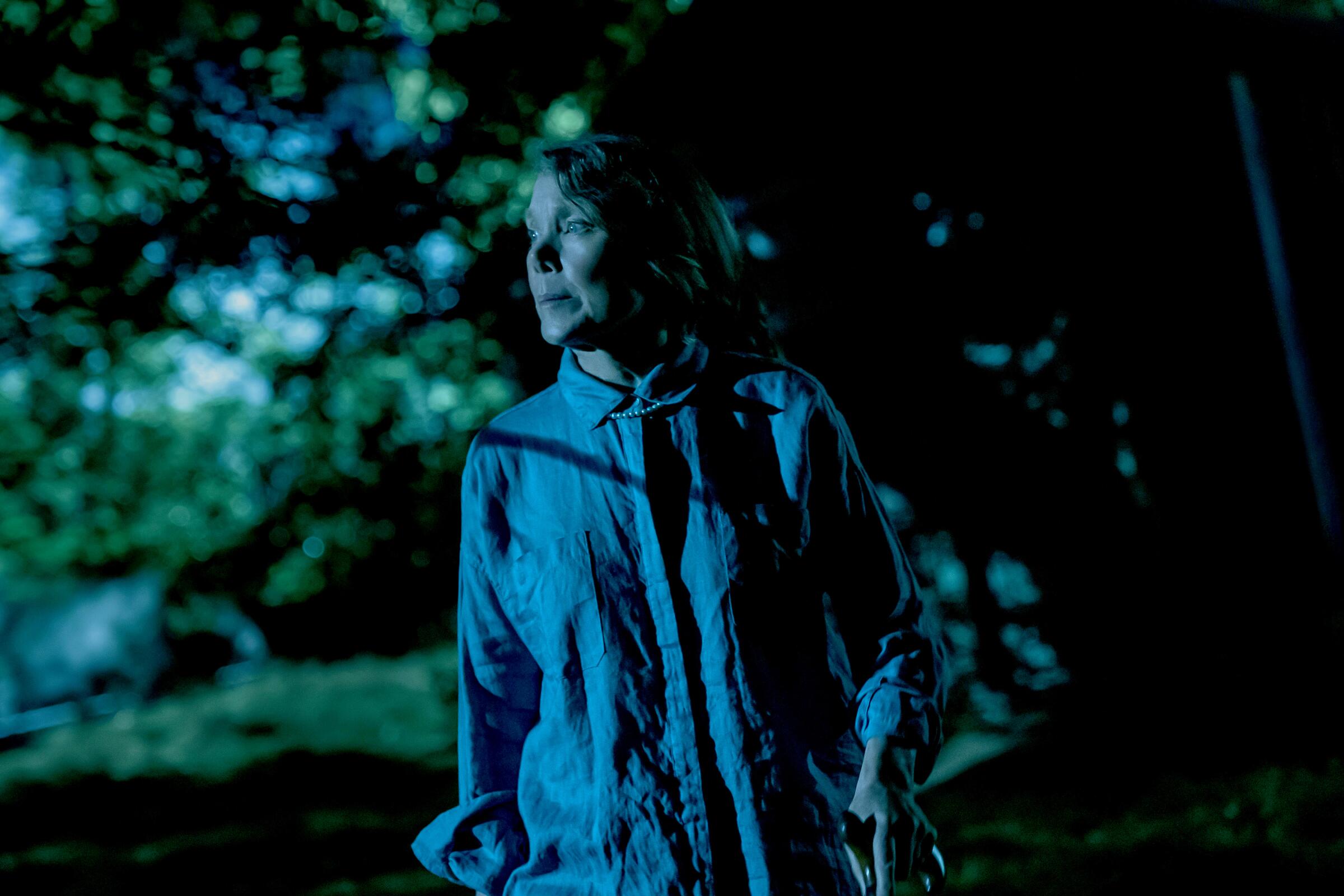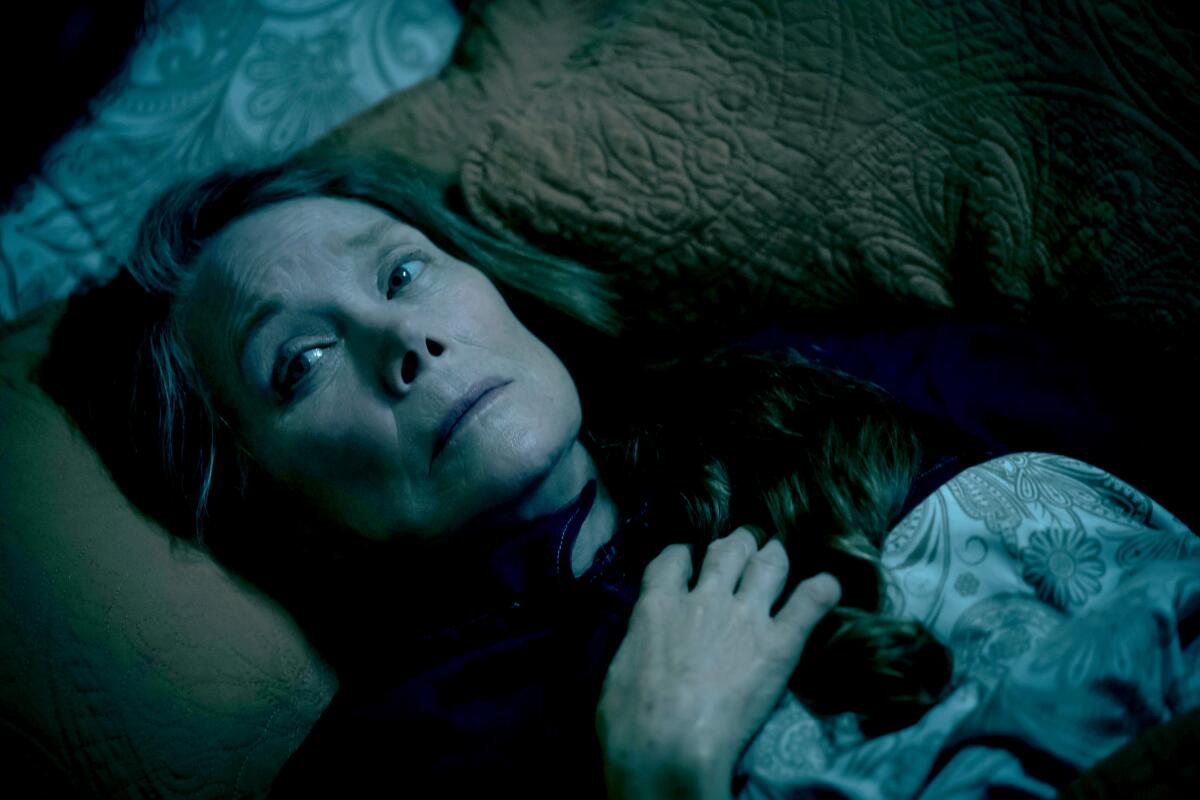Sign up for The Envelope
Get exclusive awards season news, in-depth interviews and columnist Glenn Whipp’s must-read analysis straight to your inbox.
You may occasionally receive promotional content from the Los Angeles Times.

Sissy Spacek makes her return to television riding a recent wave of series that live, at least on the fringes, in the worlds of science fiction. Along with J.K. Simmons, the two Oscar winners play retired couple Franklin and Irene York in Prime Video’s “Night Sky.” Written with Spacek in mind, the eight-episode series finds the couple navigating all the issues that come with a long life lived together — along with a family tragedy and that otherworldly portal beneath their backyard shed offering sprawling vistas of a far-away planet.
The actress speaks about the project by phone from her native Texas during a recent rainstorm. There is still a palatable passion for her craft in her voice. When I mention how much I love the new series, she says, “Brilliant, that’s just music to my ears. I, of course, was there while we were doing it but I haven’t seen it yet. So it’s exciting… I should probably interview you.”
Are you generally a sci-fi fan?
I’m not. [This is] my first foray into sci-fi. But you know, I am the girl who did “Carrie.” Characters are what draw me to anything I do. And I just loved the relationship between this older couple and all the things they’d been through. I thought, “OK, if most of Irene and Frank’s lives are rooted in reality, then that’s what I focus on.” The other, I just tried not to mess up.
Sissy Spacek remembers the kaleidoscope of emotions she felt when she earned her first lead actress Oscar nomination as the tormented telekinetic teen in Brian De Palma’s 1976 horror film, “Carrie.”
How would you describe your character and what motivates her?
Fulfilled. She raised her son, had a wonderful life. And then, tragedy strikes and changes everything. When they found this [portal] in their backyard, it triggered something in her. She wants to find meaning, understand the world, her family, the universe. I don’t think she thought a thing about the universe before all this happened. She was searching outward and looking up to the heavens, when as we know what’s really important is within us.
Did you prepare for Irene differently than how you prepared for, say, Carrie back in the day or has your approach remained essentially the same?
Time changes everything. We grow and have to find new tricks up our sleeves. The beauty for an actor is as you go through life you change, so your work changes. I look back at “Carrie” and think, “Oh, my gosh, how did I do that?” It’s all still focused on a character and their internal life, what they feel about everything. Here, the hardest part for me was I had to leap into things I didn’t know and didn’t understand. But it always came back to the loss of a child and that inner turmoil.

“Night Sky” was filmed during the COVID-19 pandemic. What was that like?
The schedule was the hardest thing. You finish an episode and put everything into it — every ounce — and it’s the greatest feeling. And then there’s another script at your door. But since it was a pandemic, you couldn’t go out and do anything, so all I did was work on lines and scenes, and sleep. And try and get ready for the next episode, because they’re coming at you fast. And I have to trick my memory, I have to get dialogue in my long-term memory. It used to be in my 20s I would read the script once and I’d know everybody’s part.
IMDb says you’ve made more than 53 films. Are there one or two you’re proudest of?
“Badlands,” directed by Terrence Malick and where I met my husband [art director Jack Fisk], and of course getting to work with Martin Sheen. I learned so much about how it takes a village to make a film and it’s not just you up there, you stand on everyone’s shoulders. And of course, “Carrie” and “Coal Miner’s Daughter” with my life-long dear friendship with Loretta [Lynn]. I loved “The Help.” “In the Bedroom” — such a great piece of art. And “The Straight Story” — I’ve always loved David Lynch. He’s a childhood friend of my husband.
“I always think of acting as like catching a moving train and sometimes you caught [catch] that train and it takes you away and oftentimes, the train hits you and runs you over.”
— Sissy Spacek
After all these decades, what do you love most about making movies?
The collaborative aspect of it is what really floats my boat. It’s just the best. Because you always go in and think, “This is what I’m going to do,” and then you’re so affected by what others do it takes you to a whole other place. When I was young, I always described it as when you reach for a doorknob and right before you touch the door, you know you can get a little electric shock. To me, working with directors and other actors and artists on the film, that’s what it is — you go in and then get that electric shock from what everyone else brings and that lifts you and makes your character much more dimensional.
Has your career gone as you’d planned, or have you been constantly surprised by it?
I feel so fortunate, because I was in the right place at the right time. I feel grateful, very very grateful. I’ve had a really interesting … I don’t know what …
Satisfying, yes?
Satisfying, a very satisfying career, and I remember thinking, “I wanna be like Barbara Stanwyck. How do I do that?” I want to experience each decade and human thing I’m going through and use it in my work. I want to work when I’m old. I haven’t had any great master career plan except in what speaks to me. Every time I work, I think, “Oh, my gosh, how do I do this?”
Even after all this time?
Even after all this time. I always think of acting as like catching a moving train and sometimes you [catch] that train and it takes you away and oftentimes, the train hits you and runs you over. When a scene really played and a director would say, “OK, now let’s do that again. Do just what you did.” And I’d think, “What did I do?” Because you’re having an out-of-body experience; when it’s in the moment, it takes you away with it. You forget everything.
Sign up for The Envelope
Get exclusive awards season news, in-depth interviews and columnist Glenn Whipp’s must-read analysis straight to your inbox.
You may occasionally receive promotional content from the Los Angeles Times.